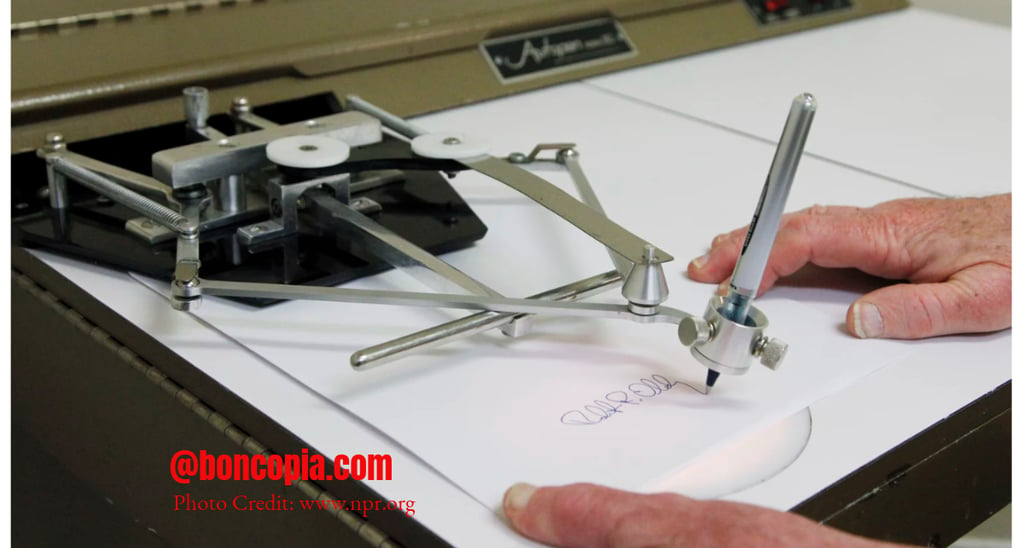The Autopen Controversy: Trump's Challenge to Biden's Legacy
5/21/20254 min read


The Autopen Controversy: Trump's Challenge to Biden's Legacy
In the ever-turbulent waters of American politics, a new storm is brewing over the use of an autopen—a device that mechanically replicates a signature. Donald Trump, never one to shy away from controversy, has taken aim at the Biden administration's use of this tool, suggesting that it renders actions taken during Biden's tenure, including pardons, null and void. This claim, rooted in a broader narrative of questioning the legitimacy of Biden's presidency, has sparked a fierce debate about the legality, constitutionality, and political implications of such a move. As we delve into this issue, we uncover a complex tapestry of historical precedent, legal ambiguity, and partisan maneuvering that could reshape the political landscape.
The Autopen: A Tool of Convenience or Controversy?
The autopen, a mechanical device used to sign documents, has been a part of presidential administration for decades. Presidents from Thomas Jefferson to Barack Obama have utilized it, often for routine correspondence or when time constraints necessitated a swift signature. However, Trump's recent assertions that Biden's use of the autopen was improper and illegal have thrust this practice into the spotlight. The claim is that Biden's signatures, particularly on pardons and executive orders, were not personally affixed, thus undermining their validity.
This argument hinges on the idea that the Constitution does not specify how a president must sign documents, but Trump and his allies suggest that the use of an autopen outside the president's presence is unconstitutional. This perspective is supported by some legal scholars, like Terry L. Turnipseed, who argue that the presence of the president is crucial when signing high-value transactions like bills or pardons. Yet, the lack of a specific law governing autopen use leaves room for interpretation and debate.
Historical Precedent and Legal Ambiguity
Historically, the autopen has been used by several U.S. presidents, often without significant controversy. Thomas Jefferson, Harry Truman, Gerald Ford, Lyndon B. Johnson, John F. Kennedy, and Barack Obama all employed this tool at various points. The practice was generally accepted as a matter of administrative efficiency, especially for non-substantive documents. However, Trump's challenge to Biden's use of the autopen marks a departure from this norm, transforming a procedural tool into a political weapon.
The legal landscape is equally murky. The Constitution grants the president broad clemency powers without stipulating how these must be exercised. This ambiguity has allowed for a range of interpretations, from personal signatures to delegated authority. The Biden administration's use of the autopen, reportedly agreed upon by the White House team and legal counsel, fits within this broad framework. Yet, Trump's insistence that such actions are invalid introduces a new layer of complexity, potentially setting the stage for legal battles over the legitimacy of Biden-era policies.
Political Implications: Reversing Biden's Legacy
Trump's rhetoric about voiding Biden's pardons and potentially overturning other actions, such as the appointment of Ketanji Brown Jackson to the Supreme Court, signals a broader intent to undo Biden's legacy. This move is not just about the autopen; it's a strategic effort to delegitimize the previous administration and assert control over the current political narrative. The "Big, Beautiful Bill," a legislative package aimed at fulfilling Trump's campaign promises, is part of this strategy, promising to reverse policies seen as detrimental to American interests.
The potential reversal of Jackson's appointment, in particular, would have profound implications. As the first black woman on the Supreme Court, her presence has been a milestone in American judicial history. Undoing this appointment would not only alter the court's composition but also ignite a firestorm of political and social backlash. It raises questions about the stability of judicial appointments and the extent to which a new administration can rewrite the past.
The Role of Partisan Maneuvering
At the heart of this controversy is partisan maneuvering. Trump's claims about the autopen are amplified by conservative media and resonate with his base, who view Biden's presidency as illegitimate from the outset. This narrative aligns with ongoing efforts to investigate and potentially prosecute actions taken during Biden's term, further polarizing an already divided nation.
The agreement between the White House team and legal counsel on the use of the autopen underscores the administrative reality of managing a presidency. Yet, Trump's challenge to this practice reflects a willingness to exploit legal ambiguities for political gain. It’s a reminder that in the realm of politics, perception often trumps (no pun intended) legality.
Thought Questions for Readers
As we navigate this complex issue, several questions emerge:
Does the use of an autopen truly undermine the legitimacy of presidential actions, or is it a procedural tool that has been unnecessarily politicized?
What are the broader implications of challenging the validity of a previous administration's actions, especially in terms of judicial stability and political trust?
How should the legal system address the lack of clear guidelines on presidential signature methods, and what role should Congress play in clarifying these ambiguities?
In conclusion, the autopen controversy is more than a procedural dispute; it's a battleground for competing visions of American governance. As Trump seeks to reverse Biden's legacy, the nation watches to see whether this challenge will reshape the political landscape or fade into the annals of partisan rhetoric. One thing is clear: in the world of politics, the pen—whether real or mechanical—is mightier than ever.
hello@boncopia.com
+13286036419
© 2025. All rights reserved.